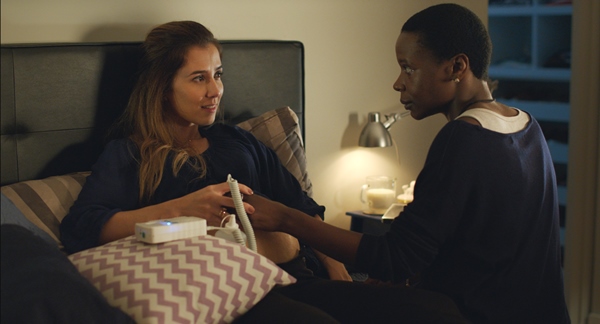Within the history of movie bestiary, werewolves are such unfortunate monsters. Unlike their vampire cousins, there are not many remarkable werewolf movies. The Wolf Man (1941) was a minor success for Universal, compared to Dracula or Frankenstein, and it set a pattern for future adaptations.
There have been new efforts to bring back the tragedy of a man becoming wolf during a full moon, even if just a few films, like An American Werewolf in London (1981) and The Company of Wolves (1984) have contributed something noteworthy to the myth. That is why the Brazilian film Good Manners stands out immediately as a welcome entry to the canon. Written and directed by Juliana Rojas and Marco Dutra, the story excels above the average werewolf movie when it explores intriguing and new aspects of the classic monster.
The movie first focuses on two alluring female characters. Clara (Isabél Zuaa), a nurse who has no family, is hired as a nanny by Ana (Marjorie Estiano), a 29-year-old wealthy, pregnant woman who broke up with her fiancé and has been rejected by her family. Clara is very cautious and doesn’t ask many questions, even with the knowledge that her boss keeps a gun in her bedroom.
Clara assures that this is Ana’s habit from being raised on a farm. The last time Ana used the gun was the night she became pregnant by a stranger in a car close to a forest. A wolf tried to attack her when the man disappeared (her tale is matched with suggestive and beautiful graphic illustrations). Clara firmly suspects something is wrong with Ana, that there is something sinister about her pregnancy.
Under full moon nights, Ana sleepwalks to satisfy her bloody appetites, followed closely by Clara, who watches out for her in a protective way. Ana never remembers what happens on those nights. Clara stays with her employer despite the danger of being hurt, and the two women form a friendship that turns sexual.
The true werewolf movie comes later in the second half, which focuses on Joel (Miguel Lobo), Ana’s son raised by Clara. The child ignores his origins, never tastes meat, and for three nights a month he has to be chained to a wall in a sealed room. When he wakes up with full hair over his body and long nails, he doesn’t know what happened. (The adult werewolf looks realistic, but the cub looks animated.) Clara takes care of him as a loving mother. Still, he wants to understand who is he and why he can’t do what other boys normally do. Clara’s answers never satisfied him. This story line is told as a bittersweet fairytale about the consequences of breaking adult rules.
The balance between the two parts stumbles a little. The two halves are so dissimilar to each other that each almost represents a different movie. The first section is an art-house horror film with the best and most disturbing scenes, highlighted by mesmerizing mood, shock value, slow-burn terror, and blazing eroticism. The thrilling relationship between Clara and Ana creates a bond that erodes their respective loneliness and erases their social differences. By contrast, the second half never matches the same intensity. While both parts work well, the switch midway feels abrupt. Yet throughout, the understated work by Zuaa is impressive. The movie is an excellent showcase for a talent that demands recognition.
A recurring motif is the use of moving songs interpreted by the characters in scenes that flirt discretely with musicals. It’s an example of the smart choices behind this inventive movie. Though it doesn’t always fulfill the promises of its first hour, Good Manners leaves an impression more lasting than a howl (by the way, a sound you never hear here).







Leave A Comment